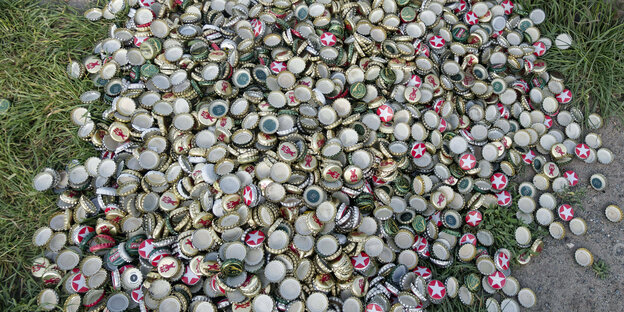Binge drinking is less popular than ever among young people. This should make older people in particular reconsider their spending habits.

Full is no longer the order of the day Photo: Jürgen Held/imago
Holding your 14-year-old friend's hair out of her face for hours while she vomits her heart out; Calling an ambulance to pump an unconscious classmate's stomach at the hospital: It sounds harsh, but 10 years ago it was the daily reality for many young people, including mine. This semi-hidden and partly traumatic world of adolescence was trivialized by young people and adults in an almost nostalgic glorification as a “cultural asset” or “character development.” That seems to be slowly changing…finally.
In 2022, binge drinking among young people has fallen to a new low. According to a study by the Kaufmännische Krankenkasse – KKH, 10,680 children and young people aged 12 to 18 from all over Germany were treated in a clinic for acute alcohol poisoning. That's down 5 percent from 2021 and down 13 percent from 2020. Compared to 2019 numbers, it's a decrease of 40.5 percentage points. In view of home schooling and bans on going out and contact, the coronavirus pandemic is an obvious explanation. But above all, the pandemic seems to have accelerated an already existing trend.
According to the Federal Center for Health Education, alcohol and cigarette consumption among young people has been declining for years. This may be because drugs are becoming more problematic in society as a whole. Thanks to addiction prevention and the Internet, young people can now know much more about the risks than they did a few years ago.
Alcohol, for example, is a neurotoxin. It affects the brain directly and causes long-term damage to brain functions. There is a similar trend in smoking, where the number of never smokers and non-smokers has also been steadily declining since the 2000s. At the same time, awareness about health and fitness is growing. For several years, for example, people have given up alcohol for a month as part of the #dryjanuary initiative. However, that does not mean that young people do not consume anything. Cannabis use, for example, increased in the 2010s, according to the Federal Center for Health Education.
just don't drink
At the same time, today's young people have more diverse knowledge about the world. Through digital media, they are not only more informed about the risks of alcohol and drugs in general, but they are also exposed to more diverse lifestyles and set their priorities differently. Drawing your own boundaries and simply not drinking is much more accepted today than in previous generations. Does this make youth culture less excessive? Not necessarily. It may be less dangerous for your health. Instead of excessive drinking, there are now other forms of pressure to conform. Beauty and health standards often conflict with excessive alcohol consumption.
The possible explanations for the decline in excessive alcohol consumption are complex, but the facts are clear. The KKH study once again gives hope that the social normalization of alcohol among the younger generations is finally coming to an end. The current cannabis debate has recently highlighted the double standards used in the drug debate in Germany. Cannabis is a gateway drug, alcohol is a pleasure. This trivialization must finally come to an end. There is no such thing as healthy alcohol consumption, and today's youth know this better than any previous generation.